Vegan Cultural Traditions Around the World
Introduction:
In a world where ethical, environmental, and health concerns are at the forefront of societal discourse, veganism has emerged as a powerful movement advocating for sustainable living practices. Beyond being a mere dietary choice, veganism encapsulates a philosophy that seeks to minimize harm to animals, protect the planet, and promote well-being. To truly appreciate the depth and breadth of veganism, it's imperative to delve into its cultural and historical roots, exploring how diverse societies have embraced plant-based diets throughout the ages.
The Historical Roots of Veganism:
The history of veganism and vegetarianism stretches back millennia, with ancient civilizations laying the groundwork for ethical dietary choices. Figures like Pythagoras in ancient Greece and the Buddha in ancient India are renowned for advocating compassionate living and abstaining from the consumption of animal products. Their teachings emphasized the interconnectedness of all living beings and the importance of practicing ahimsa, or non-violence. These early proponents of plant-based diets paved the way for future generations to embrace veganism as a means of aligning their actions with their values.
Ethiopian and Eritrean Plant-Based Traditions:
Ethiopian and Eritrean cuisine boasts a rich tapestry of plant-based dishes influenced by centuries-old traditions and Orthodox Christian fasting practices. Injera, a spongy flatbread made from teff flour, serves as a staple accompaniment to a variety of flavorful stews and vegetable dishes. Dishes like shiro, a thick chickpea or lentil stew, showcase the ingenuity of Ethiopian and Eritrean cooks in crafting delicious plant-based meals. These culinary traditions not only reflect the resourcefulness of these cultures but also underscore the abundance of nutritious plant-based ingredients available to them.

India's Vegetarian Legacy:
India stands out as a beacon of vegetarianism, with a cultural and religious landscape that has long celebrated plant-based diets. Hinduism, Jainism, and Buddhism advocate for ahimsa and the sanctity of all life, leading millions of Indians to adopt vegetarianism as a way of honoring these principles. From fragrant curries to savory snacks, Indian cuisine offers a treasure trove of plant-based delights that cater to a variety of tastes and preferences. Staples like dal (lentil stew), sabzi (vegetable curry), and roti (whole wheat flatbread) form the backbone of Indian vegetarian fare, showcasing the diversity and versatility of plant-based ingredients.
Veganism in Israel:
Israel has emerged as a global leader in veganism, boasting the highest percentage of vegans per capita. This remarkable transformation can be attributed to a confluence of factors, including a burgeoning awareness of animal rights, a growing concern for environmental sustainability, and a burgeoning market for vegan products. Tel Aviv, in particular, has earned a reputation as a vegan-friendly city, with an abundance of plant-based eateries, vegan shops, and cruelty-free products. From indulgent vegan cheese platters to creamy cashew butter and cholesterol-free vegan mayo, Israelis have embraced a diverse array of plant-based foods that cater to their ethical and culinary preferences.
Global Vegan Movements and Modern Impacts:
In recent years, veganism has transcended geographical boundaries, spreading across continents and permeating diverse cultures. This global phenomenon can be attributed in part to the rise of social media, which has facilitated the sharing of information and the dissemination of vegan ideals. From Asia to Africa, Europe to the Americas, people are increasingly embracing plant-based diets as a means of reducing their environmental footprint, improving their health, and advocating for animal rights. The proliferation of vegan products, from plant-based meats to dairy alternatives, has made it easier than ever for individuals to adopt a vegan lifestyle without sacrificing taste or convenience.
Challenges and Adaptations:
Despite the growing popularity of Veganism, adherents still face challenges in cultures that are deeply entrenched in animal product consumption. Dining out can be a minefield of limited options and hidden animal ingredients, while social gatherings may pose awkward moments of explaining one's dietary choices. However, with creativity and resourcefulness, vegans can navigate these challenges and adapt their diets to suit their ethical and nutritional needs. From whipping up homemade fat-free butter to experimenting with flavorful garlic butter alternatives, vegans are constantly innovating and reimagining traditional dishes to align with their values.
Conclusion:
As we reflect on the cultural and historical journey of veganism, it becomes evident that this movement is more than just a passing trend—it's a profound shift in consciousness that has the potential to transform our relationship with food, animals, and the planet. From ancient philosophers to modern-day activists, individuals have sought to live in harmony with nature and each other, embracing plant-based diets as a means of fostering compassion and sustainability. As we look to the future, let us continue to celebrate the diversity and richness of vegan culinary traditions while striving to create a more compassionate and sustainable world for all beings.








